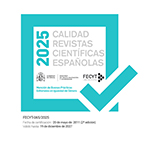Transferencias culturales y guerra de ideas durante las independencias. Lecturas contrarrevolucionarias de Rafael de Vélez en Nueva España/México (1813-1822)
Resumen
El artículo reconstruye los procesos de transferencia y de circulación de ideas contrarrevolucionarias durante la etapa de las emancipaciones hispanoamericanas. Atiende a la incidencia que tuvieron en Nueva España/México, entre 1813 y 1822, dos escritos del fraile peninsular y publicista reaccionario Rafael de Vélez: Preservativo contra la irreligión (1812) y Apología del altar y del trono (1818). Aunque con tratos distintos, estas obras fueron reeditadas, leídas con interés y, en su caso, modificadas por los conservadores mexicanos. La vieja teoría de la conspiración revolucionaria sirvió de hilo conductor a los diferentes sentidos que se les dieron. El discurso reaccionario del padre Vélez sirvió primero para cohesionar los lazos con el gobierno español e impugnar las propuestas de los insurgentes y, a partir de 1821, para justificar la independencia y reforzar la posición del emperador Agustín de Iturbide. La manera en que se actualizó dicha interpretación muestra la capacidad del antiliberalismo para adaptarse y renovar las premisas de la tradición.
Descargas
Descarga artículo
Licencia
La Revista Complutense de Historia de América, para fomentar el intercambio global del conocimiento, facilita el acceso sin restricciones a sus contenidos desde el momento de su publicación en la presente edición electrónica, y por eso es una revista de acceso abierto. Los originales publicados en esta revista son propiedad de la Universidad Complutense de Madrid y es obligatorio citar su procedencia en cualquier reproducción total o parcial. Todos los contenidos se distribuyen bajo una licencia de uso y distribución Creative Commons Reconocimiento 4.0 (CC BY 4.0). Esta circunstancia ha de hacerse constar expresamente de esta forma cuando sea necesario. Puede consultar la versión informativa y el texto legal de la licencia.











